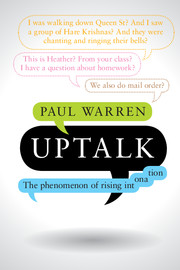Book contents
- Frontmatter
- Dedication
- Contents
- List of figures
- List of tables
- Preface
- Acknowledgements
- List of symbols and abbreviations
- 1 Introduction – why ‘uptalk’?
- 2 The forms of uptalk
- 3 The meanings and functions of uptalk
- 4 Uptalk in English varieties
- 5 Origins and spread of uptalk
- 6 Social and stylistic variation in uptalk use
- 7 Credibility killer and conversational anthrax: uptalk in the media
- 8 Perception studies of uptalk
- 9 Uptalk in other languages
- 10 Methodology in uptalk research
- 11 Summary and prospect
- References
- Index
1 - Introduction – why ‘uptalk’?
Published online by Cambridge University Press: 05 December 2015
- Frontmatter
- Dedication
- Contents
- List of figures
- List of tables
- Preface
- Acknowledgements
- List of symbols and abbreviations
- 1 Introduction – why ‘uptalk’?
- 2 The forms of uptalk
- 3 The meanings and functions of uptalk
- 4 Uptalk in English varieties
- 5 Origins and spread of uptalk
- 6 Social and stylistic variation in uptalk use
- 7 Credibility killer and conversational anthrax: uptalk in the media
- 8 Perception studies of uptalk
- 9 Uptalk in other languages
- 10 Methodology in uptalk research
- 11 Summary and prospect
- References
- Index
Summary
Before engaging in a detailed discussion of the forms and functions of uptalk, it is important to provide an outline description of what is meant by uptalk and to motivate why this book refers to this phenomenon as ‘uptalk’. In addition, this chapter provides some background information on intonational analysis more generally, as well as introducing some of the methodological issues that will be expanded on in a later chapter.
Defining uptalk
It would seem that uptalk needs a new publicity agent. It has been referred to as an ‘irritating verbal tic’ (Marsh, 2006) and a ‘real credibility killer’ (DiResta, 2010). If you are a speaker who uses uptalk, then you sound ‘as if you don't know your own mind and would like someone else to make it up for you’ (Parkin, 2005), or that you have ‘lost your own sense of power’ (Edenson, 1996). You may also suffer from a crisis of identity, since an utterance with uptalk ‘sounds like a question posed by an Australian’ (Adams, 2009), but may also indicate that you are ‘really a central Canadian’ (Watson, 2000) or are someone who has ‘tinges of California upspeak curling the edges of his sentences’ (Hoad, 2005). These comments give a flavour of the opinions expressed in the popular press about this intonational feature, but they also indicate that discussion of this phenomenon is widespread. As we will see in Chapter 7, these opinions have tended to be negative, largely condemning the use of uptalk and often providing strong advice that it should be avoided if you want to speak properly.
The term ‘uptalk’ is not (yet) listed in the Oxford English Dictionary or the Merriam-Webster Dictionary, not even in their online versions (www.oed.com and www.merriam-webster.com. All online dictionary entries discussed in this section were accessed on 6 November 2014). However, the online resource Oxford Dictionaries calls uptalk ‘A manner of speaking in which declarative sentences are uttered with rising intonation at the end, as if they were questions’ (www.oxforddictionaries.com), while Dictionary.com defines it as ‘a rise in pitch at the end usually of a declarative sentence, especially if habitual: often represented in writing by a question mark’ (http://dictionary.reference.com) and the Urban Dictionary as a ‘way of speaking that puts an upward inflection on the last word of a statement that makes it sound like a question when it's not.
- Type
- Chapter
- Information
- UptalkThe Phenomenon of Rising Intonation, pp. 1 - 19Publisher: Cambridge University PressPrint publication year: 2016

